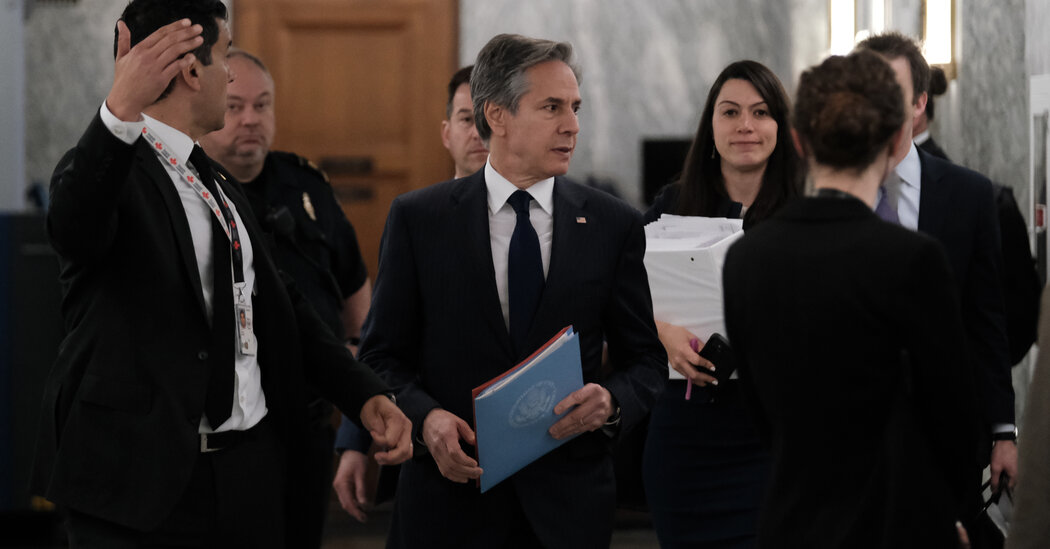
WASHINGTON — Secretary of State Antony J. Blinken said Thursday that despite Russia’s invasion of Ukraine, China remains the greatest challenger to the United States and its allies, and that the Biden administration aims to “shape the strategic environment” around the Asian superpower to limit its increasingly aggressive actions.
“China is the only country with both the intent to reshape the international order and, increasingly, the economic, diplomatic, military and technological power to do it,” Mr. Blinken said in a speech laying out the administration’s strategy on China. “Beijing’s vision would move us away from the universal values that have sustained so much of the world’s progress over the past 75 years.”
The speech was a much shorter, public version of the administration’s classified strategy on China, which was largely completed last fall. U.S. officials have concluded that decades of direct economic and diplomatic engagement to compel the Chinese Communist Party to abide by the American-led order have largely failed, and Mr. Blinken asserted that the goal now should be to form coalitions with other nations to limit the party’s influence and try to curb its aggressions in that way.
“We can’t rely on Beijing to change its trajectory,” he said. “So we will shape the strategic environment around Beijing to advance our vision for an open and inclusive international system.”
China’s statements before and during Russia’s invasion of Ukraine have further clarified for American and European officials the difficulties of engaging with Beijing. On Feb. 4, two weeks before the invasion, President Vladimir V. Putin met with President Xi Jinping in Beijing as their two governments issued a 5,000-word statement announcing a “no limits” partnership that aims to oppose the international diplomatic and economic systems overseen by the United States and its allies. Since the war began, the Chinese government has given strong diplomatic support to Russia by reiterating Mr. Putin’s criticisms of the North Atlantic Treaty Organization and spreading disinformation and conspiracy theories that undermine the United States and Ukraine.
Read More on Biden’s Trip to Asia
In his speech, given at George Washington University on the theme “Invest, Align and Compete,” Mr. Blinken noted the human rights abuses, repression of ethnic minorities and suppression of free speech and assembly in the regions of Xinjiang, Tibet and Hong Kong. In recent years, those issues have galvanized greater animus toward China among Democratic and Republican politicians and policymakers. “We’ll continue to raise these issues and call for change,” he said.
Mr. Blinken reiterated the longstanding U.S. policy on Taiwan, despite remarks by President Biden in Tokyo on Monday that the United States had a “commitment” to get involved militarily to defend Taiwan if China attacks the self-governing democratic island. The U.S. government for decades has maintained a policy of “strategic ambiguity” on Taiwan — leaving unsaid whether it would directly defend the island from China. Mr. Blinken said it was China’s recent actions toward Taiwan — trying to sever the island’s diplomatic and international ties, for instance, and sending fighter jets over the area — that were “deeply destabilizing.”
But Mr. Blinken stressed that despite the rising concerns, the United States was not seeking a new Cold War and would not try to isolate China, the world’s second-largest economy. He reiterated a point that Mr. Biden and his national security aides have made since Mr. Biden’s presidential campaign of 2020 — that there are areas of cooperation with China, including climate change, health security and the global economy.
Mr. Blinken credited China’s growth to the talent and hard work of the Chinese people, as well as the stability and opportunity of the rules on global trade and diplomacy created and shaped by the United States in what Washington calls the international order. “Arguably no country on earth has benefited more from that than China,” he said. “But rather than using its power to reinforce and revitalize the laws, agreements, principles and institutions that enabled its success, so other countries can benefit from them too, Beijing is undermining it.”
Following China’s accession to the World Trade Organization in 2001, which the United States supported, leaders in Beijing carried out far-reaching changes to the nation’s planned economy to open up further to outside trade and investment, helping to transform China from one of the world’s poorest countries into its biggest factory hub, and lifting hundreds of millions of people into the global middle class. But China stopped far short of becoming the free-market democracy that many in the West had hoped, and over the last decade, under Mr. Xi, the Communist Party and Chinese state have exerted an even heavier hand over the private market and individual freedoms.
Both Democrats and Republicans now see Chinese trade practices, including the government’s creation of heavily subsidized national champions and its acceptance of intellectual property theft, as one of the biggest factors undercutting American industry.
The Biden administration introduced one of its key elements in efforts to shape the economic environment around China — the Indo-Pacific Economic Framework — during Mr. Biden’s visit to Tokyo this week. The United States and 12 Asian nations will try to negotiate new agreements to create more resilient supply chains, set new rules for how electronic data is shared and stored, reduce greenhouse gases emitted by industry and eliminate bureaucratic hurdles that hold back trade, among other proposals.
But skeptics have said the ability of Washington to shape trade in the Asia-Pacific region may be limited because the framework is not a traditional trade agreement that offers countries reductions in tariffs and more access to the lucrative U.S. market.
The Obama administration had proposed such a deal, the Trans-Pacific Partnership, and Mr. Biden had supported it. But some Democrats and Republicans in Congress who worried about its potential for sending more jobs offshore opposed it. President Donald J. Trump withdrew the United States from the agreement, though other Asian nations moved forward with it, and China has since applied to join it.




